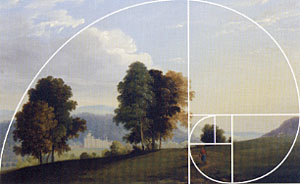Drawing Faces and the Golden Section

Our next assignment is learning how to draw faces. Yes, yours! Aren't you excited? As I learned to draw faces, I started to look at faces differently. I now look at the relationship between the parts of the face. How far apart are eyes? How about the way shadows are cast on cheekbones and chins. What gives a face character? Dimples? Pimples? Wrinkles? Scars? This week spend some time studying the faces in your life. Look at symmetry, how big is the forehead in relation to the other parts of the face. What gives your face character and is uniquely you? How can you portray that in a drawing? Where do the dark values vs. light values naturally occur on your face?
This week look at pictures of yourself and choose a picture that is a close up of your face or one that you can enlarge. It must have detail! You should be able to see all your features well. Another option if you are pressed for time or can't find a good photo with detail, find a picture in a magazine where the whole page is taken up by the face- beauty magazines have good pictures to use.

As you study and observe, you will start to see the proportions that naturally occur on your face. When looking at the ratios or spaces between the forehead and eyes, nose and mouth do you see anything interesting? You should, because these proportions and patterns are found all over the place in nature and were created in the ancient world. This patterning was discovered long ago, in the 6th century BC, by mathematicians. It was used by the Egyptians to build the pyramids. Artists like Leonardo da Vinci, used it when he painted the Mona Lisa., as well as, musicians and scientists have used it throughout the ages. It is called the
Golden Section or Golden Mean. Believe it or not we are still using this in design today, take a look at the iPod or iPhone both were designed with the Golden Section theory. Sweet! To watch a video on this, visit this website HERE (WARNING there is a nude,The Vitruvian Man,famous drawing, created by Leonardo da Vinci circa 1490.) This short You tube is fascinating and gives us perspective and insight into our created world. HERE is a website with Golden Section applied to the human face. SO cool! HERE is a tutorial on the female face to draw step-by-step. If you click on the image it will get bigger so you can print or look at it. Have fun this week!NEW UPDATE: You can get the practice worksheets for class HERE and HERE (3 pages total) if you wish to practice(which I hope you do in preparation for this week!)

